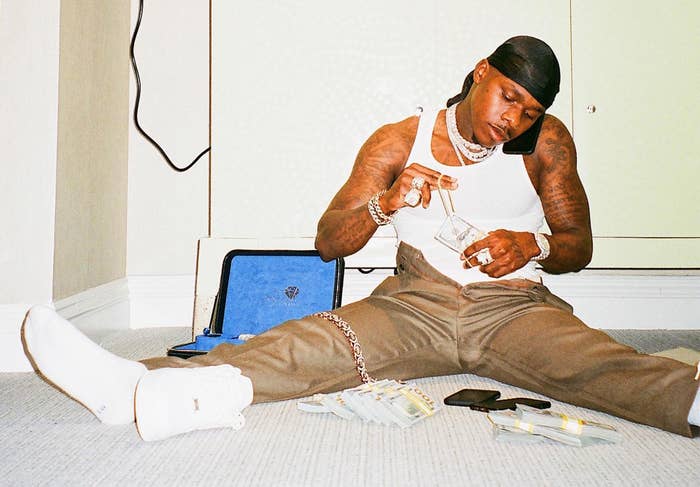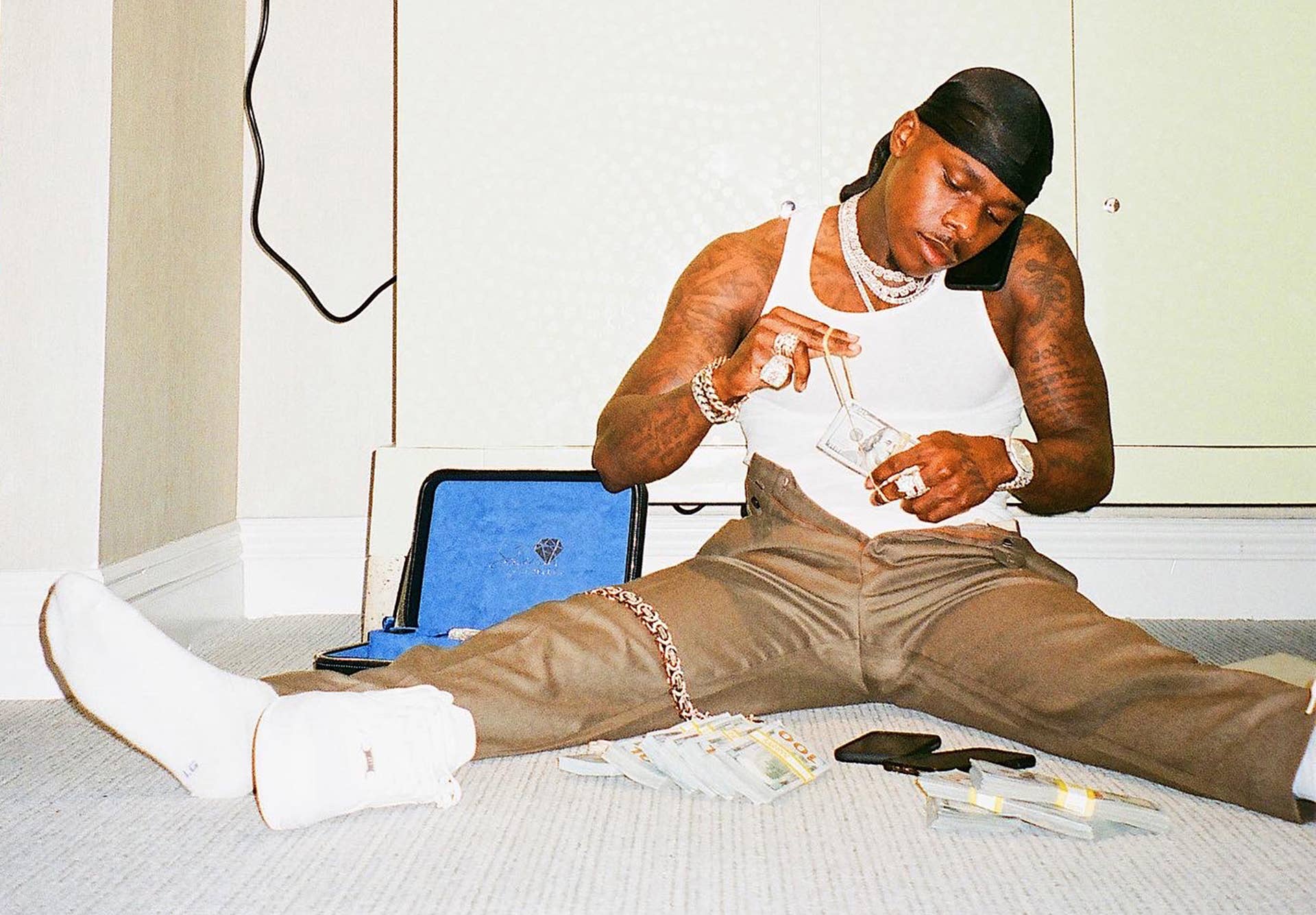
DaBaby may not know the password to his Twitter account, but he’s certainly reading his mentions. Jokes about the rapper’s flow and songs being incredibly similar to each other have become commonplace online, particularly after he released two studio albums in a seven month span. His sophomore studio LP, KIRK, was positioned as his swaggering “I made it” record, as DaBaby grappled with his newfound success, as well as the untimely death of his father. The album produced a few hit singles and showed glimpses of self-reflection, but it also fueled more memes about his repetitive style. He clearly took the comments to heart, as Blame It On Baby, his first album of 2020, sees DaBaby consciously pushing out of his comfort zone, to mixed results.
Blame It On Baby works more naturally as Baby’s first true life-after-fame album. He spent the last year establishing himself as one of rap’s most incandescent new stars, but is now trying to prove he has longevity. He’s attempting two difficult tasks here, setting out to prove he’s capable of making more than one kind of turn-up track, while also reckoning with the increasingly visible highs and lows of his public and personal life. The lowest low was an incident in early March where he slapped a female fan at a Tampa concert, claiming it was because she invaded his personal space while taking a picture of him. DaBaby issued an apology on Instagram, though he stressed that the fan failed to show him respect, undercutting the message. The woman filed a lawsuit, adding to the rapper’s laundry list of legal troubles including an arrest in Miami this January, and another in his hometown in December, though the latter has been derided for being racially motivated.
Blame It On Baby gets off to a roaring start with “Can’t Stop,” continuing Baby’s trend of strong album openers. Despite a fairly unimaginative hook, he’s rapping as well as he ever has, taking stock of his family (“My daughter took care of forever off music”), flexing about his fame (“I'm all on the TV and net, I'm too viral”), and attempting to brush off the aformentioned controversies (“Finger fuck allegations, keep hatin’/I’m patiently waitin’ on niggas to prove it”).
DaBaby has playfully discussed run-ins with the law on earlier songs like “Taking It Out” and “Off the Rip,” but on Blame, the recent incidents seem to take more of a toll on his psyche. “Only answer to God, I’m already convicted/If I’m havin’ you as my witness,” he says later on “Can’t Stop.” He doubles down on the Nils and Wheezy-produced standout “Talk About It,” rapping, “The media believing 'em, they wanna see me go back/Rich nigga can't rob a broke nigga and you know that/Locked a nigga up in South Florida like he Kodak.” Elsewhere, he relies on trite lines about being vilified that land with more of a thud.
While his easy charisma, zany music videos, and boundless enthusiasm made him a star, DaBaby takes himself noticeably more seriously on Blame It On Baby. That works well on tracks like lead single “Find My Way,” where he genuinely sounds wayward and wounded atop arpeggiated guitar plucks from DJ K.i.D, or “Champion,” a boilerplate inspirational anthem elevated by Baby’s truly excellent, emotional delivery. It backfires on “Pick Up,” where DaBaby and Quavo sleepwalk through a track that feels less imaginative and incendiary than his 2019 Offset collaboration, “Baby Sitter.” The same is true for “Drop,” which features A Boogie Wit Da Hoodie and sounds like it’s engineered for Apple Music’s Rap Life playlist, not actual enthusiastic listeners.
DaBaby’s worst experiment in uncovering a new sound is “Sad Shit,” a lovelorn ballad which features an awkward attempt at auto-tune falsetto that’s clearly borrowed from Future’s HNDRXX phase. In the verses, he sounds genuinely hurt, rapping angrily about a run-in with an ex and her new boyfriend, but the track loses all its momentum and drags on the hook and its rambling outro.
The rapper fares better on “Blame It On Baby,” a self-aware cut with two contrasting instrumentals. He switches between a staccato flow that recalls his Blank Blank era, and a cascading one that reminds us of DaBaby’s considerable technical skill. “‘I thought he couldn't switch the flow, how the hell he switchin' the beat up?’/They don't know who they fuckin' with, do this shit with my feet up,” he raps confidently on the third verse.
Like KIRK, Blame It On Baby is an A-list affair featuring some of the biggest names in rap. Roddy Ricch acquits himself the best of them all on the guitar-powered “Rockstar,” though the song would likely be one of the lesser cuts on his Please Excuse Me For Being Antisocial album. DaBaby and YoungBoy Never Broke Again share a thrilling kinetic energy on “Jump,” the kind most of Blame’s tracks lack. DaBaby is a game and willing collaborator—as evidenced by his run of features over the last 18 months—but often his songs with other big names don’t have the momentum of his solo cuts or records with lower wattage acts like Stunna 4 Vegas or Blac Youngsta.
Megan Thee Stallion and Ashanti show up as game companions for the freaky romp “Nasty,” which recaptures a portion of the magic from Baby and Meg’s stellar “Cash Shit.” Some of Baby’s lyrics—“Tryna kill the pussy, call the ambulance, get a stretcher”—are uncomfortable in light of recent events, though he finds an interesting, subtly melodic flow on the track’s final verse.
As a body of work, Blame It On Baby is a step down from both Baby on Baby and KIRK, but it could be just as crucial to his long-term success if he can finetune the array of deliveries and sounds he’s playing with here. As a consideration of his equally turbulent and triumphant recent past, Blame offers some raw insights that show the man behind that high-wattage smile, but there’s a bit too much reliance on me-against-the-world tropes.
Ultimately, DaBaby was in a no-win situation when he recorded this. If he made an album that played fully to his strengths, he would risk audience fatigue, but tweaking the formula too much could have alienated fans of his freewheeling, 808-heavy bangers. In turn, Blame It On Baby is an occasionally fascinating, often frustrating no man’s land of a record that could either be the start of a new chapter or the beginning of the end. Like everything else in his career, we’ll likely know sooner than later.


